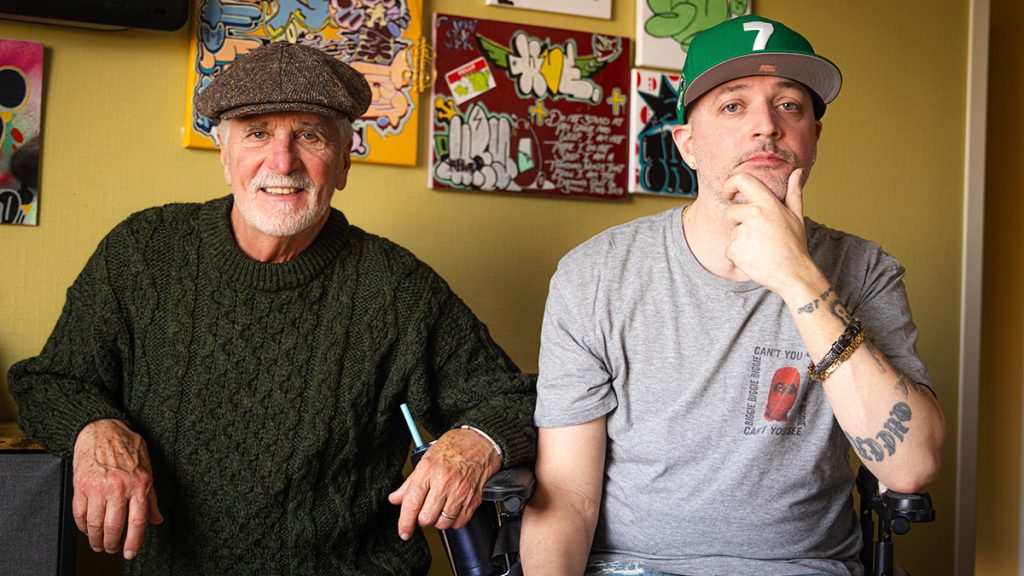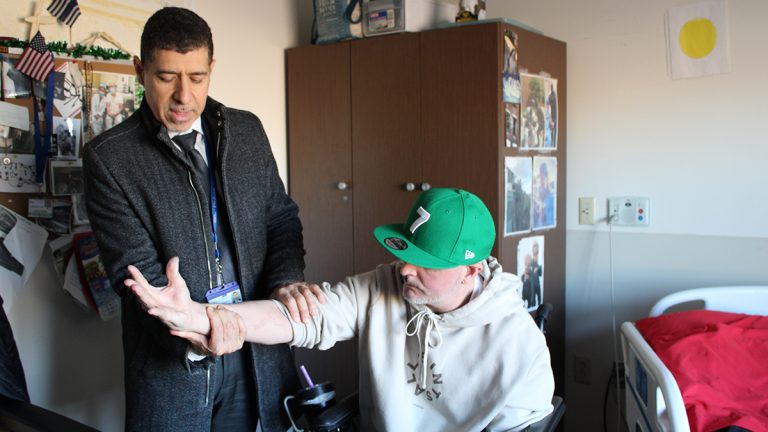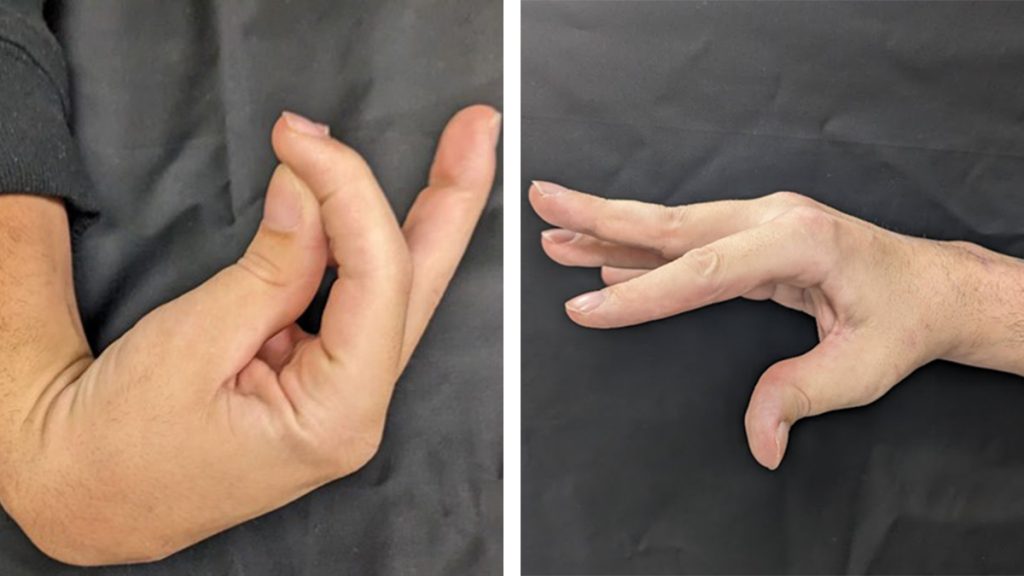
Courtesy NYC Health + Hospitals
After a Decade, Father and Son Share a Meal Again
MOHAMED FARGHALY
mfarghaly@queensledger.com
For the first time in over a decade, Harry Perks Jr. will sit at the table this Father’s Day and feed himself. A simple act — but one that, until recently, was unimaginable.
The 43-year-old Queens resident nearly died from a heroin overdose in 2015 that left him in a coma for 30 days and caused permanent brain damage. For 3½ excruciating minutes, his brain was deprived of oxygen. The result was spasticity and muscle contractures that left him unable to speak clearly, walk unassisted, or use his right hand — until now.
For the past 11 years, Harry Sr. has served as his son’s full-time caregiver, navigating a healthcare system often short on answers but full of challenges. From feeding tubes to fears of amputation, the road to recovery has been long and painful. “He looked like a fetus,” Harry Sr. recalled. “His knees up under his chin, his arms were curled. It was really scary stuff.”
But then came a breakthrough.
After years of therapy and Botox injections that brought modest improvement to Harry’s legs and left hand, his physiatrist, Dr. Jonah Green at NYC Health + Hospitals/Woodhull, referred him to orthopedic hand surgeon Dr. Eitan Melamed at NYC Health + Hospitals/Elmhurst.
Harry’s right hand — curled tightly at the wrist and long rendered useless — had become a daily reminder of all that had been lost. But Dr. Melamed saw potential.

“I thought he’s a great candidate for surgery because he’s just a tough guy,” Melamed said. “He wants to get better. He has an amazing family support… Harry is very, very goal oriented.”
The procedure, a three-hour selective neurectomy, involved lengthening contracted muscles and cutting motor nerves to decrease the exaggerated tone. It was a delicate dance of weakening the overactive muscles and bolstering the weaker ones to restore balance. “Once we lengthen the contracted muscle and augmented the weak muscles and added the neurectomy, he could slowly start using his arm,” Melamed explained. “You can open the hand, acquire objects, and close the hand and grip objects.”
Four months after surgery, Harry could do something he hadn’t in over a decade — grasp a fork, hold a cup, type a message. “Harry’s confidence just went through the roof after the hand was done,” said his father. “The biggest thing that I’ve seen was his confidence level… you could see it in his eyes and his whole attitude was like, ‘Okay, I’m almost normal again.’”
The recovery wasn’t easy — splints, therapy, and the hard relearning of basic functions. But Melamed emphasizes it wasn’t just the surgery that made the difference. “I really created a very strong connection with him and his dad… I think what stands out in Harry is his motivation and his family support. And these two ingredients, in addition to the surgery, were the key to his recovery.”
Harry Sr., a lifelong Queens resident who lives near Juniper Park, now reflects on their journey with equal parts sorrow and pride. “These last two years, now we couldn’t be closer,” he said. “We wound up here… but the last 10 years have been nothing but a miracle.”
For Harry Sr., the moments after surgery were filled with quiet victories — like watching his son grasp his walker more firmly, or beating him in an arm-wrestling match. “He’s stronger than me,” he laughed. “We arm wrestle, and now he’s beating me. In the old days he couldn’t, but now he’s doing it.”
The emotional cost has been high, but so has the reward. “I just look at him, I see how much he’s developed. That’s what it means to me,” said Harry Sr. When asked what he’s most proud of about his son, he answered simply: “Everything. What he came through, how he fought, how he didn’t give up.”

This Father’s Day, over a shared meal, that resilience will be quietly celebrated. “It’s our best times in the backyard,” said Harry Sr. “That’s when we really sit and talk about what’s going on.”
Harry Jr., who communicates sparingly, managed a sentiment that speaks volumes: “Father’s Day is every day.”
After a decade of fighting for every inch of recovery, Harry Sr. knows what matters most. “Stick with it,” he said to other families facing long-term caregiving. “It’ll happen if you put the time in. You spend time with them, talking to them, giving them a hard time to make sure that they’re awake and realize what’s going on around them. They can come back… He did. He’s proof.”
And when asked what he’s most proud of?
“Everything,” he said. “What he came through, how he fought, how he didn’t give up. Yeah. It’s everything.”
For more information on the Center for Hand Surgery at NYC Health + Hospitals/Elmhurst, which offers comprehensive care for hand, wrist, forearm, and elbow conditions, call 718-334-2663.


